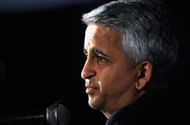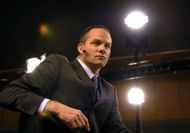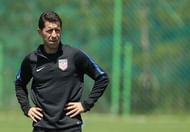The United States will not participate in the 2018 FIFA World Cup.
That's a very difficult sentence to write, and one that I've stared at for several minutes before continuing on with this article.
October 10, 2017, is a day that will be etched into the memory banks of every single player, coach, executive and supporter of the United States Men's National Team. USSF, as we know, it died a horrible death on the rain-soaked pitch of Ato Bolden Stadium in Trinidad with the Yanks unable to overcome a 2-0 deficit, succumbing to the Soca Warriors by a final score of 2-1.
While supporters sit in bars across the country, licking their wounds and staring into their half-drank glasses, the question that will eventually come to everyone's mind is the same one:
"How could this happen?"
The answer to that question is a complicated one, and while we're going to hear a lot about recent scapegoats such as Bruce Arena and Jürgen Klinsmann, the problem runs far deeper than the appointment of managers. While small decisions such as Arena's failure to call up top players such as Fabian Johnson are going to loom large, there are other problems to worry about.
#1 The United States youth system is a mess
The United States is quite unique when it comes to the beautiful game, and not in a good way. Many nations around the world have youth systems entrenched with the biggest clubs in their top divisions, going as far down as the U-8 level. Players go to school and train with the club throughout their adolescence. While other countries such as England have different issues in their youth system, it can be argued that USSF and it's youth governing bodies put profit above everything else.
USSF recognises several groups, including USYS, USCS, and AYSO. Essentially, USSF allows these groups to operate independently (to an extent) which allows the groups to enlist a pay-to-play system that ultimately freezes out a lot of youth. Looking up any chapter to see what the start-up fees are, and you'll find numbers that can push into four figures just for a single season and can be as short as just four months.
Some leagues are figuring this out and find ways to subsidise the cost for players, such as getting sponsorships. However, there are plenty of instances where academies are charging for everything including travel, training, uniforms, etc. MLS is far from immune to the criticism as well, and their youth academies may be the worst offenders.
Pay-to-play is obviously the biggest issue here. Coaches that are tasked with the challenge of trying to train players and find playing time for all of them, regardless of their skill level, causes the system to fracture. Granted, MLS youth academies are far harder to get into and only the best survive the cuts. With the other leagues that are far more widespread? Pay-to-play is always going to be the model unless USSF steps up and figures out an alternative.
#2 USSF needs a complete overhaul

As of press time for this article, Bruce Arena is still listed as the head coach of the USMNT. That's probably going to change once their plane lands back in the mainland. MLS playoffs are right around the corner and European leagues start back up next weekend. The 23 players who made up the squad will now be tasked with putting their international failure aside and get back to club play.
USSF, however, has no such constraints and needs wholesale changes sooner rather than later. The only good that comes out of failing to qualify for the World Cup is that USSF now has an extended period of time to find the right coach for the job. The United States' next few international breaks are going to be interesting in that they will now be warm-up matches for nations going to the biggest stage and not vice versa.
The annual January camp will be comprised primarily of players in North America, but the focus now needs to be on younger players. Tim Howard, Clint Dempsey, DeMarcus Beasley, Landon Donovan, and several others will be done with this squad. Klinsmann, to his credit, used the January camp as best as he could to try and find players in the second tier of talent that could be contributors. Bruce Arena was expected to be doing the same in three months, but there is good reason to believe that he will not be around long enough to do that.
As for executives, Sunil Gulati's time is over. While the United States has been a force on the women's side, including adding that third star over the badge in 2015, the failures on the men's side can no longer be ignored.
They should have never been ignored in the first place, but the federation seemed to accept that finishing in the Round of 16 in the World Cup was good enough to keep their coaching staff in place. Gulati needs to be removed or he needs to resign. USSF needs new leadership, a new system, and an overhaul in the worst way.
#3 A new "Project 2010" must be priority no. 1

In 1998, USSF created Project 2010, a 12-year plan for the United States to win the 2010 World Cup. The plan included a $50 million development project that saw the creation of Generation Adidas and the U-17 residency camp, though the latter of those two will be fully closed by the end of the year with the changes in the U.S. Development Academy.
Eric Wynalda has stated he has a 14-year plan to completely change the system. While nobody knows if he's the answer or not, a certainty is that anyone who is up for any future presidential position with USSF must have a plan in the short term and long term to change how the United States moves forward.
#4 Regaining lost momentum is going to be difficult

This is the hardest part of the entire issue. The United States has relied on its successes in the international game to drive up interest and bring in new fans to the sport. While the NFL, MLB, NBA, and NHL dominate U.S. headlines, soccer has been gaining traction over the last decade.
Attendance levels are steadily rising year after year and with larger stadiums being included such as CenturyLink Field in Seattle or the new Mercedes-Benz Stadium in Atlanta, the interest is there. Supporters clubs for international teams are also on the rise as larger cities are finding more people wanting to come out and enjoy Saturday and Sunday morning soccer.
The United States missing the World Cup for the first time since 1986 is going to be a major blow, but it won't be insurmountable. Those who are already entrenched in the game aren't going anywhere, but growth will be difficult in the coming months with no World Cup to look forward to. MLS will be relied on, as well as the second division NASL, in order to keep interest high.
#5 Finding the right man to lead the charge is vital

There will be a lot of names thrown around in the coming weeks as to who will replace Bruce Arena. It is important to remember that, if everything I wrote prior to this section is 100% true, then USSF needs to think outside the box when considering a replacement. A coach in the current USSF system may not be a bad idea, but given the circumstances, a big splash may have to occur in order to facilitate that change. So who is on the shortlist? Here are a few to consider:
Marcelo Bielsa (Lille)
Bielsa, at 62 years old, has both the experience and pedigree to be a successful manager for the United States. The Argentine has managed Argentina and Chile at the international level and European clubs such as Athletic Bilbao, Marseille and Lazio. His record is fairly impressive at 242-162-144 and could be the spark that this squad desperately needs.
David Wagner (Huddersfield Town)
Bob Bradley was supposed to be the American manager that made England sit up and realise that the United States had talent at all levels. Instead, it's David Wagner who is earning those plaudits.
The former United States defender took Huddersfield Town to the Premier League and the side are currently firmly in the mid-table. Wagner's style is creative enough that it would work at the international level and the 45-year-old's experience as a player at clubs such as Schalke and Eintracht Frankfurt will command respect. This is an outside shot, though, as Huddersfield have no interest in losing their top man.
Tab Ramos (USMNT U-20s)

Ramos would be considered a safe choice in the current USSF system. He knows the youth system inside and out and has seemingly been groomed for the main spot. The criticism of this choice, however, would be that Ramos has never managed anything other than the U-20s and may not be able to handle the pressure that comes along with international management.
Gregg Berhalter (Columbus Crew SC)
Another former United States International, Berhalter is an interesting choice to consider given he has both played and managed in Europe much like David Wagner. Berhalter had 44 caps for the United States from 1994-2006, including the United States' thrilling 2002 campaign where they reached the quarterfinals, only to lose to Germany.
Berhalter played for European sides Crystal Palace and 1860 Munich before rotating back to the States and finishing his career with the LA Galaxy. He returned to Europe for two seasons to coach Hammarby IF in Sweden before taking on his current role with Columbus Crew SC.
Berhalter's system promotes possession and attacking, but the criticism here is that he is not open to changing his style too often. International managers need to adjust to other sides, something that would be a hindrance to Berhalter's managerial style.
Caleb Porter (Portland Timbers)
Porter's name is going to be mentioned as much as anyone else, given his recent success. Guiding Portland to the MLS Cup in 2015 is his crowning achievement, but he's also won at the collegiate level with Akron in 2010. Porter is also on the younger side at just 42 years old, and if the United States are going to insist on trying to keep managers in place for longer than one World Cup qualification cycle, Porter could be a great fit as a long-term selection.
